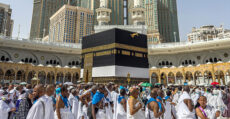Reference: al-Mulakhkhas al-Fiqhee – Volume 1, Pages 261-264
It’s obligation is indicated in the Qur.aan, the Sunnah and al-ijmaa’ (major consensus), as follows:
1) {O you who believe! Observing the fasting is prescribed for you as it was prescribed for those before you, that you may become al-Muttaqoon (the pious). [Observing fasts] for a fixed number of days, but if any of you is ill or on a journey, the same number [should be made up] from other days. And as for those who can fast with difficulty, (i.e. an old man, etc.), they have [a choice either to fast or] to feed a miskeen (poor person) [for every day]. But whoever does good of his own accord, it is better for him. And that you fast, it is better for you if only you know. The month of Ramadhaan in which was revealed the Qur.aan, a guidance for mankind and clear proofs for the guidance and the criterion [between right and wrong]. So whoever of you sights [the crescent on the first night of] the month [of Ramadhaan i.e. is present at his home], he must observe the fasting that month, and whoever is ill or on a journey, the same number [of days which one did not observe fasting must be made up] from other days. Allaah intends for you ease, and He does not want to make things difficult for you. [He wants that you] must complete the same number [of days], and that you must magnify Allaah (i.e. to say Takbeer (Allaahu-Akbar – Allaah is the Most Great) on seeing the crescent of the months of Ramadhaan and Shawwaal) for having guided you so that you may be grateful to Him}, [Soorah al-Baqarah, Aayaat 183-185]
And the mention of the command {prescribed} is indicative of it’s obligation.
2) And the Prophet ﷺ said:
«Islaam is built upon five [pillars]…»
…and amongst them he mentioned the fast of Ramadhaan.
And the ahaadeeth indicating it’s obligation and it’s excellence are many and are well known.
The wisdom behind the legislation of fasting [Ramadhaan] is that it involves purification and cleansing of the soul from evil manners and characteristics. This is because fasting restricts the influence of Shaytaan upon a person, since his influence flows through the human body as the blood flows.
Fasting instigates a lack of interest in worldly desires and instead causes one to remember the Hereafter. Likewise, it brings about awareness for the poor and destitute, causing one to feel their pain since the fast generates the feeling of hunger and thirst. According to the Sharee’ah, fasting means to abstain from specific things such as food, drink, sexual intercourse and other than that which is mentioned in the Sharee’ah. This is in addition to evil actions and their like.
The obligation of the daily fast begins at the adhaan of the Fajr prayer and ends at sunset [at the adhaan of the Maghrib prayer]. Allaah says:
{So now have sexual relations with them} i.e. the wives, [Soorah al-Baqarah, Aayah 187]
{and seek that which Allaah has ordained for you [offspring], and eat and drink until the white thread (light) of dawn appears to you distinct from the black thread (darkness of night), then complete your fast till the nightfall}, [Soorah al-Baqarah, Aayah 187]
And the meaning of {until the white thread of dawn appears to you distinct from the black thread} is that the light of dawn is distinct from the darkness of night.
The obligation of the fast of Ramadhaan begins once the month has started. There are three ways to establish the beginning of the month:
1) The sighting of the moon [with the naked eye]. Allaah says:
{So whoever of you sights [the crescent on the first night of] the month [of Ramadhaan i.e. is present at his home], he must observe the fasting that month}, [Soorah al-Baqarah, Aayah 185]
And the Prophet ﷺ said:
«Fast when you see it»
…so it becomes obligatory for one to fast if he sights the moon [of Ramadhaan] himself.
2) Testification as to the moon [of Ramadhaan] having been sighted or notification of it. Therefore, the obligation of fasting comes into effect if someone, who is trustworthy and fully aware of his faculties, sights the moon [of Ramadhaan] and testifies as such. This is based upon the statement of Ibn ‘Umar (radhi-yAllaahu ‘anhumaa):
«The people were looking for the moon [of Ramadhaan] and I informed the Messenger of Allaah ﷺ that I had seen it, so he fasted and ordered the people to fast». [Transmitted by Abu Daawood and authenticated by Ibn Hibbaan and al-Haakim].
3) Completing the 30 days of Sha’baan. This is when the moon [of Ramadhaan] has not been sighted on the night of the 30th of Sha’baan, [preceding the day of the 29th of Sha’baan] in addition to the presence of that which prevents the moon [of Ramadhaan] from being sighted, such as clouds or the like, since the Prophet ﷺ said:
«Indeed [each] month is 29 days [long], so do not fast until you see the moon [of Ramdhaan] and do not stop fasting until you see it (the month of Shawwaal) and if it is cloudy, then estimate».
And the meaning of «estimate» is to complete the thirty days of Sha’baan, in accordance to that which is confirmed in the hadeeth of Abu Hurayrah رضي الله عنه:
«And if it is cloudy, then count thirty days».
The fast of Ramadhaan is obligatory upon every able Muslim who is fully aware of all his faculties. Therefore, it is not obligatory upon the disbeliever and nor is it accepted from him. However, if he were to become a Muslim during the month, he would be required to fast the remainder of the month although he is not required to make up that which has passed whilst he was in the state of disbelief.
Also, the fast is not obligatory upon the one who is insane or the one who is travelling. Rather they are required to make up for that which they miss once their valid situation has changed. Allaah says:
{and whoever is ill or on a journey, the same number [of days which one did not observe fasting must be made up] from other days}, [Soorah al-Baqarah, Aayah 185]
And the address for the obligation of the fast encompasses both the traveller and the non-traveller, the one who is ill and one who is well, the one who is in a state of purity and one who is on her menses or postpartum bleeding and the one who feels faint. Therefore, fasting is obligatory upon all these people, since they have been addressed [in the command] to fast. So, when their circumstances (as mentioned above) do not permit them to fast, they are required to make up for any missed days. The non-traveller is required to fast the month whilst the woman on her menses or postpartum bleeding is excused until she completes her menstrual cycle and the blood ceases to flow. As for the one who is ill, then he is required to make up for any missed days. However, if his state permits him to fast while enduring difficulties, then there is no harm in him fasting so long as it is not detrimental to his health. So, the traveller and the one who is ill can choose whether or not to fast, without obligation.
Whoever is prevented from fasting due to any [Islaamically] acceptable reason must refrain from all that breaks the fast if the circumstance changes thus rendering them capable to fast. This includes the traveller who has arrived at his destination, the woman on her menses or postpartum bleeding who has completed her menstrual cycle, the disbeliever who has accepted Islaam, the one who is insane but regains his sanity and the young child who attains adulthood.
In addition, this includes everyone when the belated announcement is made during the day as to the month of Ramadhaan having already started. So, in this case, all Muslims are required to refrain from all that breaks the fast for the rest of the day after which, they are to make up this day whereby they had not fasted.





